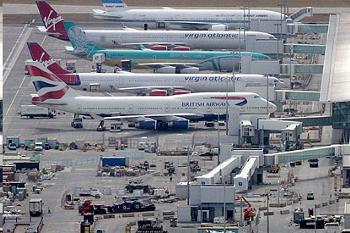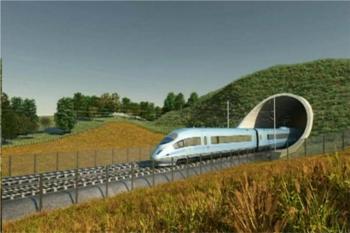The nation is gripped by two major transport decisions, airport expansion and HS2, both of which raise wider issues that need to be addressed – but behind them all is the importance of having a national plan.
This does not mean interfering with localism and telling every authority where to spend its cash.
It does include having an appropriate hierarchy of needs and key projects; a strategy for investment based on comparisons between an agreed evidence base; agreed outcomes; and the necessary collaboration between authorities/operators to deliver it. The kind of thing our prospective regional transport bodies are working on now.

Figures and predictions around Heathrow have causes controversy
One could start with individual modes of transport and work outwards.
In the recent study A Major Road Network for England, you will see a good example of just what is meant. Whether you agree with its recommendations or not, its authors set down a reasonable equation for measuring how ‘strategic’ any highway route is, allowing them to build an overall picture of the network and to make reasonable comparisons between different routes with regards importance.
As in the Major Roads study, this principle can be tweaked to reflect the importance of geographical coverage and other factors but it provides a baseline from which everything can be measured, or at least considered within the same framework.
Asset managers in local highways departments do this every day. Their whole job is based around the idea of using data to understand where and when and how to make interventions on the network to ensure the best value for money and the highest standard of road surface.
When it comes to national policy the situation can be ad hoc and often we are told a decision, any decision, has to be made - on airports, rail or tunnels under London for instance – in large part because we have already waited too long to make one, a kind of sunk time fallacy.
This is not to say decisions shouldn’t be made, or are not necessary. The problem is not that airport expansion or HS2 is wrong, or right; we leave that opinion to you. It is more that they appear to be made in the wrong way, or at least without the necessary bedrock to build an argument on.
The Government spent millions on an independent Airports Commission, whose findings, never mind its recommendation, produced an enormous amount of controversy.
Is it too much to suppose that after at least generation of debate on this issue there could be broadly agreed figures for airport expansion and its benefits – with some principles around how many flights and passengers any airport of any given size, location and connectivity both domestic and international, should be allowed to handle?
On this basis, perhaps we could have had Heathrow and Gatwick – ostensibly deadly enemies after this battle – Stansted, Luton and all the other ‘London’ airports agree to work together, to decide an appropriate plan for improving capacity and sharing flights and routes.
One can understand the benefit of a hub airport connecting the world, but it is ironic if it works in isolation at home. Different private operators would under similar principles through bus franchising powers, which are set to rolled out across the country.

HS2 - modern trains for an old fashioned industry
When it comes to rail, we also have a capacity crunch and a massive appetite for more rail travel nationwide. We are ready to invest scores of billions in HS2 as a result, yet we have not worked out how to get different operators to work together to properly provide smart, flexible, not to mention mutli-modal ticketing. The sector we are putting this cash into, its payment and pricing systems, its customer service, has not moved with the times. This is an odd disparity in terms of mobility as a service.
The world around us is becoming more measurable, making policy outcomes much easier to quantify. Yet the national transport environment, of all areas, seems strangely bereft of the kind of basic benchmarking data that can be used to build a coalition of support when it comes to major interventions and set them down as a coherent policy direction.
The National Infrastructure Commission (NIC) and reforms to the transport scheme appraisal guidance, WebTAG, could provide a solution. The Government has already U-turned and decided not to grant statutory status to the NIC but that doesn’t mean it could not set about establishing some ground rules.
As Rupert Clubb, president of the Association of Directors of Environment, Economy, Planning and Transport (ADEPT), said: ‘We welcome the fact that a decision has finally been made on airport expansion, putting an end to a long period of uncertainty.
‘We hope that lessons are learnt to ensure that significant national infrastructure investment does not sit in the doldrums for decades awaiting decisions. Investment in infrastructure and connectivity is an integral part of delivering the conditions for growth.’
There is plenty of scope for good infrastructure investment in this country. It’s time to put a plan where the money is.
Register now for full access
Register just once to get unrestricted, real-time coverage of the issues and challenges facing UK transport and highways engineers.
Full website content includes the latest news, exclusive commentary from leading industry figures and detailed topical analysis of the highways, transportation, environment and place-shaping sectors.
Use the link below to register your details for full, free access.
Already a registered? Login